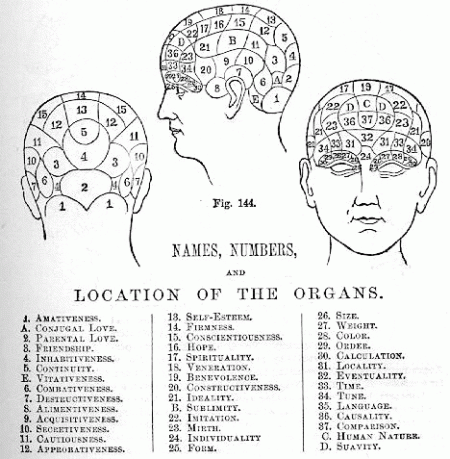D
droid
Guest
oh, ffs
Give him a chance Matt, he's obviously poor so his brain is smaller. I hear he also has the brain pan of a stage coach tilter.

oh, ffs

Well, because the mentally disabled, for instance, would be far more likely to be poor than rich. This in itself would drag the average down.
All this talk of 'intelligence' is stupid in practice, because that is not what the school/education system are measuring/looking at most of the time.
Indeed, as we have discussed many times before, there is no meaningful way of measuring intelligence.
what are you talking about?
Well, drag down the average IQ of those people that are poor.
I see that Droid has resorted to ad hominem attack and vague connotation rather than any kind of reasoned argument.
Intelligence is reflected in the quality of people's productive acts. Intelligence tests came into being because someone noticed that people who tend to do comparatively well in task A also tend to do well in task B. Those questions that gave most predicative information about a candidate's chance of doing well on other questions were selected for intelligence tests. The tests are a distillation of a wide range of tasks.
Reasoning scores correlate very highly with SATs and GCSE scores - there is plenty of research out there; I'll post it.
As for 'cultural capital', this has more plausibility if one thinks of students bullshitting their way through a humanities interview, less if the subject is maths or science. What kind of 'cultural capital' would a maths tutor want, other than an understanding of the subject?
Well, because the mentally disabled, for instance, would be far more likely to be poor than rich. This in itself would drag the average down.
Well, drag down the average IQ of those people that are poor.
But this is basically getting down to 'has been taught to be good at maths'. Which represents a problem further down the education system, rather than with the evil admissions tutors giving offers to pupils who actually do well at solving difficult maths problems.Things like how it is taught, examples used, language used, not forgetting what is put on the curriculum in the first place.
But this is basically getting down to 'has been taught to be good at maths'. Which represents a problem further down the education system, rather than with the evil admissions tutors giving offers to pupils who actually do well at solving difficult maths problems.
BTW - there are far more 'poor' people than 'rich' people, so in all likelihood there would be far more mentally disabled 'poor' than 'rich', therefore the contention that an 'average poor' person would be less intelligent than an 'average rich' person due to this factor is just rubbish - statistically speaking of course. It's specious logic.
So rich people either do not have offspring with learning disabilities, or else cast them out, so they are forced to go and live with those working class types?
But this is basically getting down to 'has been taught to be good at maths'. Which represents a problem further down the education system, rather than with the evil admissions tutors giving offers to pupils who actually do well at solving difficult maths problems.
what are you defining as 'productive tasks'?
what 'intelligence tests' are you refering to?
how are you measuring 'reasoning'?
what do SATS/GCSEs measure?
Yes, of course they may have offspring with learning difficulties BUT these offspring are less likely to be able to hold on to their money or make more of it than those with higher IQs.
...and indeed, it is a problem throughout the education system- able working class kids are less likely to be encouraged to apply to (top) universities, more likley to be put on vocational courses etc etc. As I said upthread, it is a multi causal problem, but class is the single most important factor. 'Intelligence' is a huge red herring.
Assesing someone's potential as a humanities student seems to rely a lot more on intangible impressions, though, which makes the process more susceptible to favouring people who know how to talk the talk. Whereas afaik Cambridge still base a lot of their maths interview process on 'give them some hard elementary problems, see how they get on with them / give them an exam full of hard elementary problems, see how they get on with that.'my bad, i read it as teachers rather than tutors. Maths tutors want the same as humanities ones, so the point stands.
'Productive tasks' = anything that is produced: utterances, spoken or written; artefacts etc etc
'Intelligence tests' = IQ tests, NVR or VR tests, CAT tests - the latter three all commonly used in British schools.
SATs/GCSEs measure competence in a subject but reflect intelligence as much as anything else - SATs Maths scores, for instance, correlate highly with scores on the ostensibly unrelated material in Non-Verbal Reasoning scores (no arithmetic required, for instance).
Well, here there's a problem. There really isn't any such thing as the average pupil. If you start measuring aptitude (or whatever it is you think you're measuring) through standardised testing, you get a curve of normal distribution which gives you a sort of image of a large rump of people who are fairly alike with small numbers of outliers at either extreme; but this should be regarded as a fact about statistics rather than a fact about people. (For instance, if you set a multiple choice exam and everyone just guesses the answers, you'll still get a curve of normal distribution, because there are many, many more ways of getting about half the answers right than there are of getting three quarters of them right, and only one way to get them all right)
